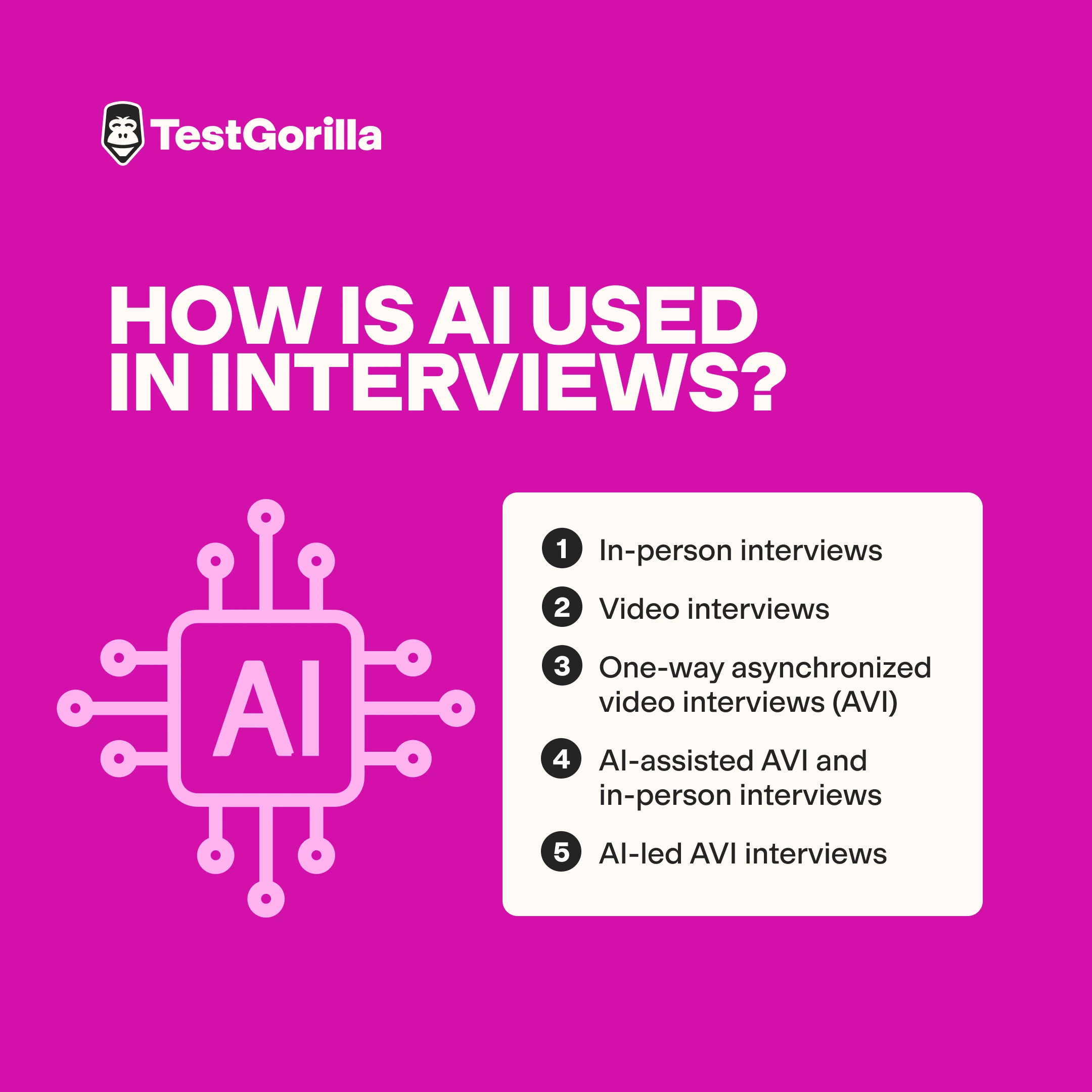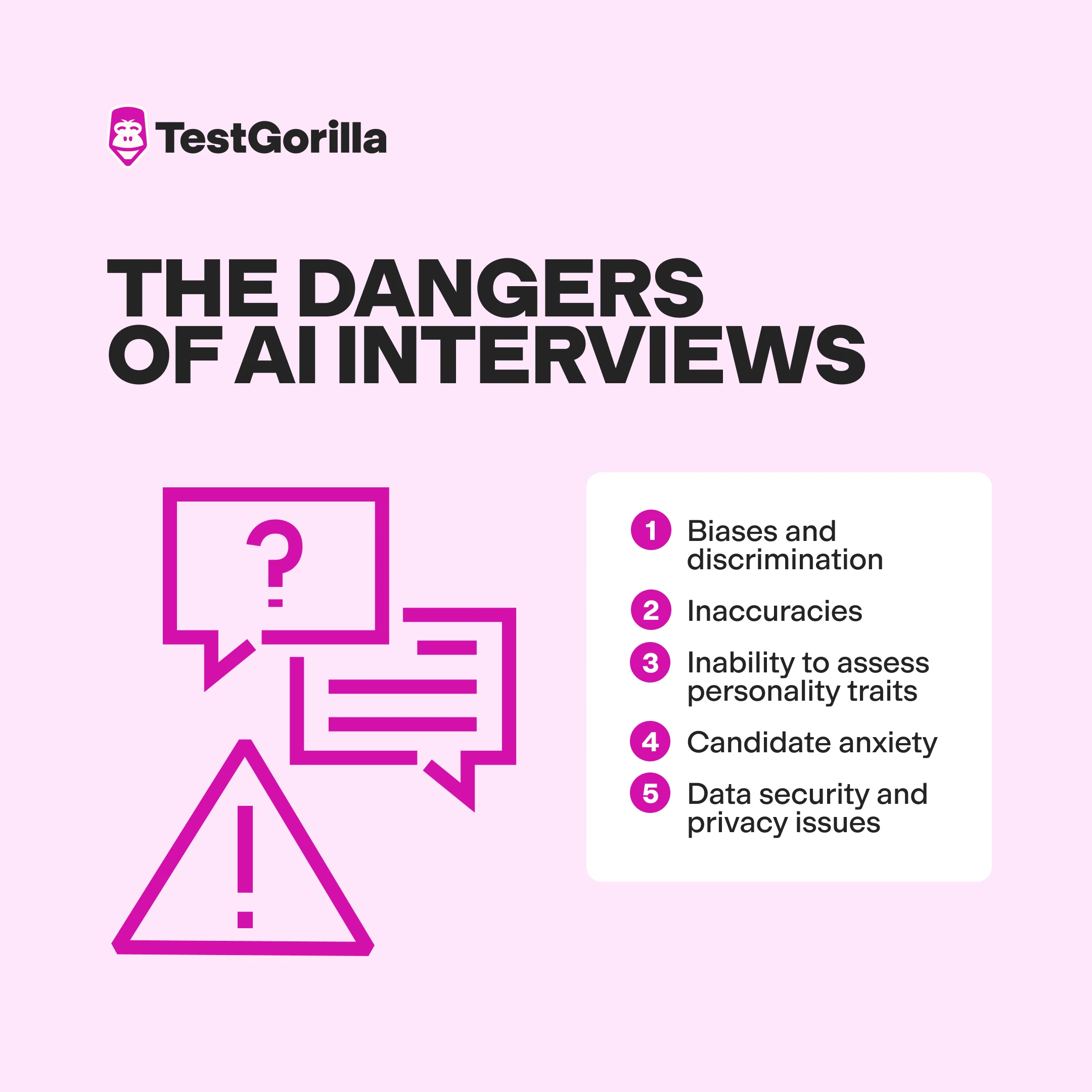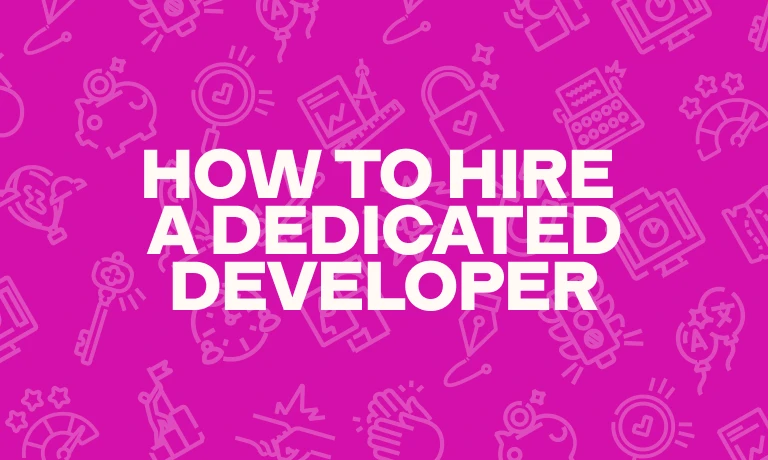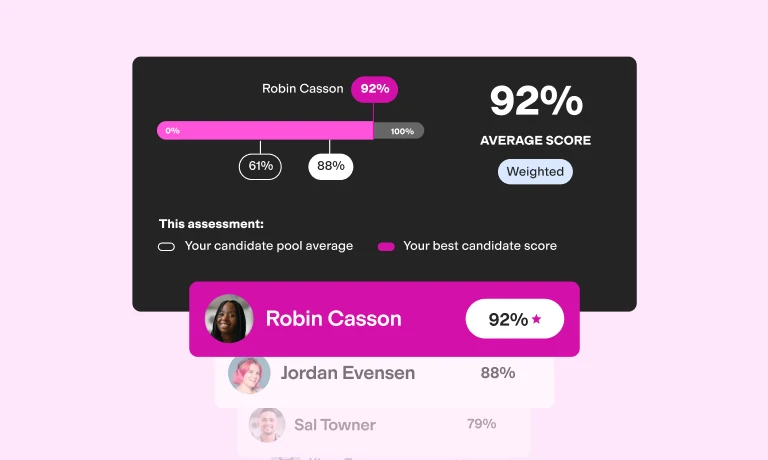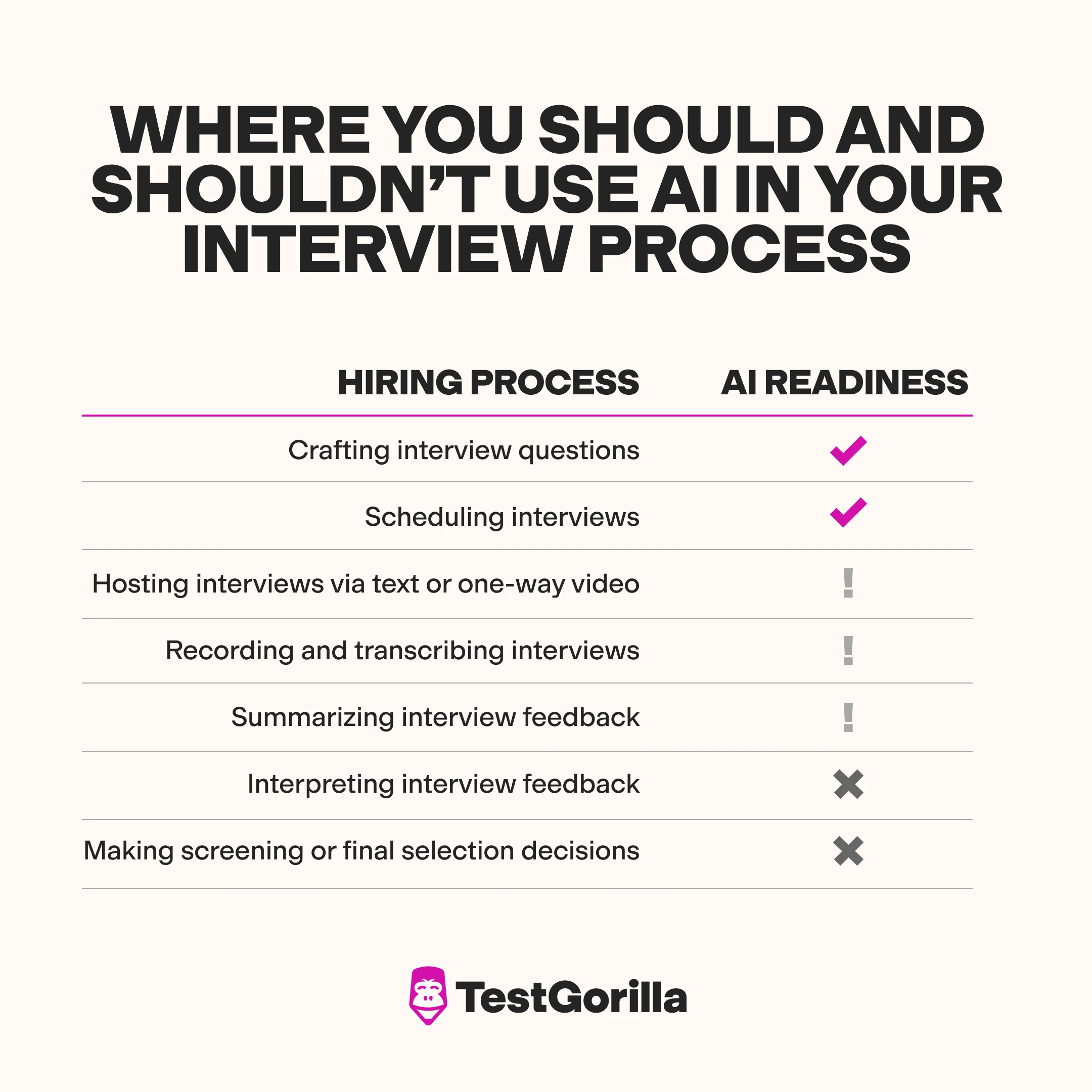Is AI ready to interview job applicants? Your guide to using AI for interviews
AI is making their way into hiring funnels everywhere. Our research shows 65% are using it in their hiring process, and 1 in 5 are even using AI to interview candidates. But what are the implications of this? Are these tools really ready to interview candidates without any human involvement? Is it too far to use AI to interview your candidates?
The consensus between job seekers is that it is. if they've made it to the interview, they want to speak to a person, not a bot.
At TestGorilla, we know there are ways to use AI interviews safely and conscientiously in your hiring process. In this article, we look at some of the risks with AI interviews and share how to use AI correctly so you can evaluate with confidence.
How is AI used in interviews?
AI can be used in several parts of the interview process – from asking candidates qualifying questions over text or video to taking notes and scanning facial expressions, tone of voice, and body language in virtual interviews. Let's look at its uses more closely.
1. In-person interviews
Typically, these interviews involve a live, face-to-face interaction between interviewers and applicants – usually at the company’s office or an offsite location, such as a café.
While you might use tech and AI to schedule the meeting, the interview is entirely human-led. It allows for instant feedback, permits real-time follow-up questions, and helps build rapport between the interviewer and the candidate.
2. Video interviews
These are live, two-way conversations hosted on video conferencing platforms, such as Zoom, Microsoft Teams, Google Meets, etc. Video interviews replicate the immediate feedback and interaction of traditional in-person interviewing while allowing remote participation. These types of interviews use tech but not AI.
3. One-way asynchronized video interviews (AVI)
Candidates participate in a one-way video interview in which they record their responses to predefined questions. Usually, candidates can participate in these interviews at their own convenience using one-way video software like TestGorilla’s. Questions are usually presented as text or through a voice-over tool.
Once candidates’ responses have been recorded, the hiring team reviews the video recordings at a later time. These interviews are almost entirely tech-led but don’t usually use AI. Feedback and decision-making are still human-led.
4. AI-assisted AVI and in-person interviews
In AI-assisted AVIs, recorded responses are reviewed by humans but also analyzed by AI algorithms. For example, AI studies candidates’ responses, facial expressions, tone of voice, etc., and helps to identify behavioral traits such as confidence and communication skills.
That said, AI assistance isn’t limited to AVIs. Today, employers also use AI note-takers during two-way virtual or in-person interviews. These help transcribe conversations, summarize key points, and outline action items. Although AI tools assist these interviews, selection decisions remain with recruiters and the hiring team.
5. AI-led AVI interviews
In AI-led video interviews, AI takes a more central role by conducting the interview and scoring the candidate. These specialized AI software help with:
Asking questions.
Probing with follow-up questions.
Providing a comprehensive analysis of responses and candidates’ expressions, tone, and body language.
Giving each candidate some kind of score for the things the interview is designed to measure.
While the AI tool is usually pre-fed with information about the role, desired skill set, and more, this type of interview occurs without human intervention – although the scores are reviewed by whoever is deciding which candidates to proceed with.
Risks associated with AI interviews
AI can help save you a ton of time and effort. However, it can also compromise the quality of your hires and land you in legal trouble. Here are some of the problems you could face with AI interviews:
1. Biases and discrimination
There’s abundant evidence that AI systems can introduce and perpetuate biases in recruitment. Even a tech giant like Amazon stopped using AI screening when its algorithms were found to favor men’s resumes over women’s, regardless of skill. Ultimately, if the data an AI tool is trained on hasn’t been thoroughly audited for gender, age, religion, and other forms of discrimination, then the tool could be biased.
Some AI tools aren’t trained to process and interpret diverse accents. While voice technology tools such as AI notetakers and virtual assistants have made many people’s lives easier, they can be frustrating and unresponsive for speakers with non-standard accents, such as Cockney or African-American vernacular.
2. Inaccuracies
The Society for Human Resource Management (SHRM) published an article about the inaccuracies of AI facial analysis tools, using the well-known video interview software HireVue as an example.
HireVue initially used facial analysis in its interview solution but later removed the feature in response to concerns about its need and accuracy. Internal research is said to have found that “visual analysis no longer significantly added value to the assessments.” Their chief data scientist also shared that while there was a correlation between facial muscle movements and job performance in some customer-facing roles, this wasn’t always the case.
3. Inability to assess personality traits
Some AI interview software uses facial, voice, and body language analysis to make judgments about candidates’ personality traits and behavioral attributes. However, a study published in the MIT Technology Review has raised major red flags about AI tools’ ability to interpret personality traits.
The software ignored the content of the answers and interpreted personality traits from the candidate’s voice alone. This demonstrates the danger of using AI interviews to evaluate candidates’ personality traits and assess job fit.
4. Candidate anxiety
In 2023, research firm Pew surveyed 11,000 American adults and found that 71% opposed AI making final hiring decisions. 66% said they wouldn’t apply to employers that used AI in hiring.
Earlier that year, Harvard Business Review reported that while candidates are impressed with AI's novelty, the lack of human connection during interviews can be daunting. Candidates felt “judged” by some sort of superior entity.
5. Data security and privacy issues
AI-powered interview tools can put you at risk of non-compliance with data privacy laws such as the California Consumer Privacy Act (CCPA), General Data Protection Regulation (GDPR), and more.
Here’s a breakdown of possible threats:
Regarding data collection and storage: AI interview tools gather and store candidates’ data. Without proper handling, these could be at risk of unauthorized access, especially when using third-party interview software.
Regarding biometric information: AI tools that analyze applicants’ biometric data, such as facial expressions or voices, must prevent this information from being leaked and misused.
Regarding a lack of transparency: Candidates may not be fully aware of what data is collected, how it will be used, and who has access to it. This raises concerns about consent and data privacy.
The best insights on HR and recruitment, delivered to your inbox.
Biweekly updates. No spam. Unsubscribe any time.
Where AI interview tools work well
With all that considered, certain parts of the interview process really can benefit from AI assistance. The key is understanding where you should and shouldn’t use AI in interviewing candidates.
Let’s look at how AI can benefit your company’s interview practices.
1. Scheduling interviews
Some software uses AI algorithms to identify interviewers’ available time slots, match them with candidates’ preferences, and automatically send interview invites – with no need for manual effort.
One study showed that 80% of employers using AI interview scheduling saved 36% of their time compared to those who did it manually. HackerRank also found that automated interview scheduling saved recruiters an average of 10 hours per week.
2. Drafting interview questions
Speaking to TestGorilla, HR and hiring expert Yashna Wahal shared that she’s benefitted from using AI to help craft first drafts of interview questions:
“Generative AI tools like ChatGPT have helped me come up with effective interview questions, both at the screening and finalizing interview stages. Crafting interview questions isn’t always easy, especially when you’re not an expert in the role."
3. Transcribing interviews
Despite problems with interpreting accents and background noise, AI notetakers are still widely used for transcribing. In fact, one survey found that nearly 50% of respondents said they used AI for transcribing.
When used with human supervision, AI notetakers can be a huge time saver. Plus, without having to worry about taking notes, you can focus on what the candidate is saying and have a fully engaged conversation with them.
4. Summarizing feedback
You can also feed generative AI solutions, such as ChatGPT or Bard, each interviewer’s qualitative and quantitative feedback about candidates. The tools can then summarize key findings and suggest how candidates compare based on set criteria. This saves time manually collating and analyzing feedback, leading to quicker decision-making.
5. Candidate practice
Lastly, AI software can help candidates practice for their interviews in various ways. For example:
Candidates can prompt generative AI tools like ChatGPT to ask them interview questions and receive constructive feedback on their responses, including insights on how to improve their answers.
Applicants might consider using specialized interview software that simulates real-life interviews and provides feedback on their answers.
Some AI tools can help record and critique candidates’ responses, communication skills, non-verbal cues, and more to help increase their confidence before the big day.
5 tips for making the most of AI interviews
Consider these tips to maximize the benefits and minimize the risks of using AI in interviews:
1. Use AI selectively
First, recognize that you don’t need AI to lead every aspect of your interview process. But equally, you don’t need to completely avoid it either.
The best approach is to use AI for processes in the early hiring stages, such as organizing interviews, but not as a replacement for human interviews.
For easy reference, we’ve created a table summarizing where you should use AI in your interview process (✅), where you shouldn't (❌), and where you can if it involves human intervention (⚠️).
Hiring process | AI readiness |
Crafting interview questions | ✅ |
Scheduling interviews | ✅ |
Hosting interviews via text or one-way video | ⚠️ |
Recording and transcribing interviews | ⚠️ |
Summarizing interview feedback | ⚠️ |
Interpreting interview feedback | ❌ |
Making screening or final selection decisions | ❌ |
2. Combine AI tools with multi-measure evaluation tools
AI is not fit for making screening and hiring decisions without human supervision. Instead, use multi-measure talent assessments, which evaluate candidates’ real-world abilities for the job. These tests measure applicants’ hard and soft skills, cognitive abilities, personality traits, culture match, and more – giving you a holistic view of their profiles.
Once you’ve shortlisted skilled candidates, have them interviewed by human beings, using AI for note-taking and feedback summaries, or for scoring (but don't forget to check the scores yourself).
3. Refine AI prompts to ensure they work correctly
Whether you’re using AI to write effective interview questions, summarize feedback, or analyze interview data, your AI system is only as good as the prompts you feed it. Make sure you define clear objectives, test out different instructions, and adjust and iterate prompts based on the system’s responses until you’re happy with the accuracy and effectiveness of the outcome.
4. Conduct regular audits to prevent bias
Regularly review and analyze the outputs from all AI systems you use to check for accuracy and identify any AI biases that could be hampering your hiring process. For a watertight approach, include HR professionals, data scientists, and legal experts in this audit process.
If you’re using any external AI tools, ask customer support or your account manager for more information about the steps they take to review their software and fix bugs and biases.
5. Provide candidates with consent, comfort, and communication
We’ve already seen that candidates tend to dislike the use of AI in the interview process. Instead of eliminating the use of AI, take steps to get candidates onboard with the AI tools you use.
To do this, remember the three Cs:
Consent: Get candidates’ consent before using AI note-takers or other tools without letting them know.
Comfort: Let candidates get comfortable before the real deal. For instance, if you’re using AI video software, pick one that lets them practice before their interview.
Communication: Be open and transparent about what data is being collected, who will be able to access it, and how it will be used.
Combine AI, human intervention, and skills assessments for the best results
AI might be revolutionizing recruitment, but the hiring process is not ready to be entirely AI-led. Interviews later on in the hiring process really do need a human touch, but using AI interviews early on in the process can be a great way to make structured, fair conversations possible at scale.
The best approach is to use AI intentionally and carefully in your interview processes. Using AI interview tools alongside objective talent evaluations with TestGorilla is a great way to take advantage of the technology while ensuring and comprehensive evaluation for all of your candidates.
You've scrolled this far
Why not try TestGorilla for free, and see what happens when you put skills first.


